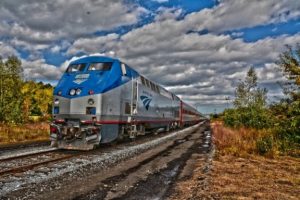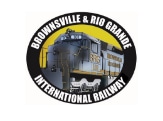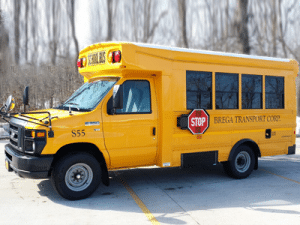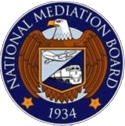For immediate release
July 7, 2017
As part of our ongoing effort to conclude national contract negotiations, the Coordinated Bargaining Group (CBG) met with the nation’s freight rail Carriers (NCCC) for three days during the week of June 26th. These efforts were part of our ongoing mediation process, mandated by the Railway Labor Act when the parties have been unable to reach a voluntary agreement, and managed by the National Mediation Board.
Despite the CBG’s best efforts to reach a fair agreement with the NCCC, the mediation process took a step backwards on Thursday, June 29th, when the Carriers presented new, onerous bargaining positions. Their new contract demands would have the employees not only paying more per month towards their monthly insurance premiums, but would also make drastic changes in the amount the average employee pays when medical services are needed. Combined with the Carriers’ outlandish demands for this dramatic cost-shifting, they suggested we agree to below-standard General Wage Increases with no retroactivity, and, for certain crafts, harmful work rules changes that would have employees doing more work for less pay in many circumstances.
It is clear from the Carrier’s latest contract demands that they are emboldened by the potential of management-friendly recommendations that could come from a Presidential Emergency Board appointed by President Trump, and ultimately be imposed on the employees by a Congress that already has enacted or is pushing for changes in longstanding labor laws that protect employee rights.
We of course are frustrated by the Carriers’ hard-line attitude. But we will not let this stand in our way. In spite of this latest turn of events, the CBG will not give up its efforts to achieve a voluntary settlement that is fair and protects our members’ best interests. We therefore requested and have been granted additional mediation sessions later this month. This is not by any means the end of the road. The Railway Labor Act makes it the duty of both labor and management “to exert every reasonable effort to make agreements.” We take that obligation seriously. Be assured that we have been working very hard on your behalf and we will continue to pursue every available avenue to achieve a fair contract settlement worthy of your consideration.
The Carrier’s latest offer is neither a fair settlement, nor a settlement that we expect our members would ratify. So that you all are fully aware of what has been proposed, and in an effort to bring all affected members up to speed, the Carrier’s latest proposal, with a brief synopsis, can be found at
https://static.smart-union.org/worksite/ContractNeg/NCCC_2017-06-29_Synopsis_and_Proposal.pdf
More information will be forthcoming after the mediation sessions scheduled later this month. We appreciate your continuing support.
# # #
The Coordinated Bargaining Group is comprised of six unions: the American Train Dispatchers Association; the Brotherhood of Locomotive Engineers and Trainmen (a Division of the Rail Conference of the International Brotherhood of Teamsters); the Brotherhood of Railroad Signalmen; the International Brotherhood of Boilermakers, Iron Ship Builders, Blacksmiths, Forgers, and Helpers; the National Conference of Firemen and Oilers / SEIU; and the Transportation Division of the International Association of Sheet Metal, Air, Rail and Transportation Workers.
Collectively, the CBG unions represent more than 85,000 railroad workers covered by the various organizations’ national agreements, and comprise over 58% of the workforce that will be impacted by the outcome of the current bargaining round.
Author: amyr

A senate committee panel recently advanced the measure along party lines with Republicans voting in favor, 14-13. U.S Senator Tammy Duckworth (D – Ill.), Iraq War Veteran, Purple Heart recipient and combat pilot for the Illinois National Guard, staunchly opposes the measure, and is quoted in the article.
Captain Chesley “Sully” Sullenberger, the US Airways pilot who heroically landed his aircraft in the Hudson River in 2009, is also adamantly opposed to the measure and voiced his opposition.
While SMART TD membership is predominately comprised of railroad and bus members, SMART TD also represents airline pilots, co-pilots, flight attendants and baggage handlers.
Click here to read the entire article.
U.S. Senator John Thune, R – S.D., introduced the provision. Click here to voice your opposition to Senator Thune.
Click here to visit the SMART TD Legislative Action Center to contact your legislative representatives to voice your opinion about this bad idea, and others that affect the safety of our membership and the safety of all Americans.
Instead of working to upgrade long-distance transportation services, and ignoring his promise to invest in American infrastructure, Trump is working to end long-distance train travel.
According to an article posted on July 3, 2017, in the San Francisco Chronicle, if Trump’s 2018 proposed budget is passed, long-distance passenger trains that have crisscrossed America for more than a century will fade into oblivion.
Despite record high numbers of Amtrak passen
Click here to read the entire article.
Jeff Duris, a member of Local 322 in Milwaukee, died on Saturday evening, July 1, 2017, surrounded by family, reported Local Chairperson Bob Alba.
Jeff was diagnosed with Creutzfeldt-Jakob Disease on June 19, 2017. Creutzfeldt-Jakob disease is an incurable and fatal neurological condition.
Chairperson Alba set up a GoFundMe Account on behalf of the Duris family. The account remains active. All donations will be used by the family to help cover medical expenses and other financial needs.
Click here to help the Duris family financially during this difficult time.
Private funeral services were held.
Recently, employees of the Brownsville & Rio Grande International Railway and Brega Transportation both voted for SMART TD representation.
Brownsville & Rio Grande International Railway, LLC

“The employees faced many hurdles and constant pressure from the company to vote against organizing,” SMART TD Director of Organizing Rich Ross said. “They are a tight knit group that deserves the benefits that union membership can bring them.”
BRG operates 45 miles of line at the Port of Brownsville, Texas, and interchanges with Union Pacific and KCSM. BRG traffic includes steel, agricultural products, food products and general commodities.
The BRG commenced operations in 1984 when the Brownsville Navigation District (BND) reclaimed Port railroad operations from the Missouri Pacific Railroad. The BND, which manages the Port of Brownsville, entered a 30-year agreement with OmniTRAX to operate and expand the business development capabilities of the Brownsville & Rio Grande International Railway on its behalf in June of 2014.
“I would like to thank SMART TD Organizer Larry Grutzius for all of his hard work on this campaign,” Ross said.
Brega Transportation

“I would like to thank SMART TD Director of Organizing Rich Ross for providing the necessary resources to make this a successful campaign. I would also like to thank New York State Legislative Director Sam Nasca and GCA VCN General Chairperson Thomas Bruce for their tireless effort in seeing this to fruition,” Studivant said.
“There was a lot of pushback from the carrier, but SMART TD stayed on message and that effort reflected in the voting. We are looking forward to securing our new bus members a far and equitable collective bargaining agreement,” Studivant added.
Brega Transport’s Yellow Bus division provides professional school bus service throughout Rockland County, N.Y.

The new agreement duration is retroactive to November 1, 2014 and goes through October 31, 2019, and provides five general wage increases totaling 14 percent with full back pay. An hourly increase of 15 percent will also be provided with the contract. Members will enjoy increased paid vacation time and establishes five to eight paid flex days per year for all employees. The agreement also provides for an increase in 401k employer contribution match from 3 to 4 percent. Members will also be enrolled in the Genesee and Wyoming Midwest Region short-term disability program.
“Former General Chairperson Brandt Bechtold, General Chairperson Chad Rossman and Local 198 President Joe Haney did an excellent job of bringing members’ concerns to the table,” said SMART TD Vice President Dave Wier.
Part of Genesee & Wyoming Inc., TZPR operates 24 track miles and interchanges with BNSF, Canadian National, Norfolk Southern, Union Pacific, Keokuk Junction Railway, Illinois & Midland Railroad, Iowa Interstate Railway and the Toledo, Peoria & Western Railway all at Creve Coeur, Ill. Commodities shipped by the railroad include chemicals, coal, construction materials, food and feed products, forest products, steel and scrap.
CSX conductors and Local 600 members Jake LaFave and Stephen Deal lost their lives June 27 when they stepped off a CSX locomotive to check an alert and were hit by an Amtrak train.
Jake J. LaFave
LaFave, 25, enjoyed spending time with loved ones, working on electronics, playing video and card games, and going on road trips. A newly wed, LaFave married his wife, Caitlin in March 2017.
A Pinckney High School, (Pinckney, Mich.) 2011 graduate, LaFave continued his education at Washtenaw Community College, in Ann Arbor, Mich., where he studied Computer Systems and Networking.
He is survived by his wife, Caitlin (Blough) LaFave; parents James and Kathy LaFave; sister, Shae LaFave; grandparents, Bud and Beverly Mancuso, and James and Marcia LaFave; and many aunts, uncles and cousins.
A public memorial service will be held at the Blough Residence on July 8 at 7 p.m. at 9833 Turkey Creek Rd., Easton, MD 21601. Family and friends are also invited to LaFave’s home at 12922 N. Cresap St., Cumberland, MD 21502, July 11 from 2 – 8 p.m. to share stories and offer condolences.
Click here to leave condolences online.
Stephen Wayne Deal
Deal, 20, was a 2014 graduate of Meyersdale Area High School, Meyersdale, Pa. He attended the Meyersdale Grace Brethren Church and was a member of the FFA, where he received the Keystone and American Degrees. Before coming to work for CSX, Deal was employed as a farm hand and as a temporary PennDOT worker.
Deal enjoyed riding his motorcycle and ATV, farming, hunting and spending time with his family.
He is survived by his parents, Donald S. and Loretta (Hetz) Deal; sister, Aleigha (Walt) Oakes; nephew, Wyatt Austin Oakes; grandmothers, Wilda Deal and Judy Hetz; great-grandmother, Thelma Durst; aunts and uncles, Rhonda (Charles) Teets, Monica (George) Porter, Teresa (Gary) Haer, Harrison (Kim) Hetz, and Jesse (Melissa) Hetz; and numerous cousins and friends. Deal was preceded in death by his pappys, Donald W. Deal and Harrison F. “Cork” Hetz Jr.
Click here to leave condolences for the family.
The National Mediation Board (NMB) announced that Harry Hoglander, NMB board member since 2002, has been designated as the new Chairman of the NMB, effective immediately.
Read the NMB press release, here:

FOR IMMEDIATE RELEASE
NATIONAL MEDIATION BOARD
Contact: NMB Public Information Line — (202) 692-5050
Re: Hoglander Assumes NMB Chairmanship
Washington, D.C. — The National Mediation Board (NMB) is pleased to announce that Harry R. Hoglander has been named Chairman of the National Mediation Board, effective July 1, 2017. Linda Puchala remains as a Member of the Board.
Mr. Hoglander, a Member of the National Mediation Board since August 6, 2002, has previously served as Chairman in: 2004-2005, 2007-2008, 2010-2011, 2012-2013 and 2014-2015. He was first confirmed by the United States Senate on August 1, 2002, reconfirmed for a second term on December 8, 2006, a third term on July 24, 2009, and a fourth term on August 5, 2013.
Prior to joining the Board, Mr. Hoglander served as a Legislative Specialist in the office of Congressman John Tierney of Massachusetts with responsibilities in Transportation issues including aviation, rail and maritime, Labor, Defense and Veterans Affairs.
Mr. Hoglander has an extensive background in the aviation industry and labor relations, having flown as a Captain for Trans World Airline (TWA) and being elected Master Chairman of TWA’s Master Executive Council. He was also elected Executive Vice-President of the Air Line Pilots Association. After leaving TWA, Mr. Hoglander was named Aviation Labor Representative to the United States Bi-Lateral Negotiating Team by then Secretary of State James Baker.
Mr. Hoglander was also a pilot in the United States Air Force, retiring with the rank of Lt. Colonel. He graduated from Suffolk University Law School and is a member of the Florida Bar.
Mr. Hoglander and his wife Judith reside in Gloucester Massachusetts. They have six children.
The National Mediation Board is an independent Federal agency established by the Railway Labor Act, which governs labor-management relations within two key transportation sectors of the United States and U.S. territories: the railroads and airlines. The National Mediation Board is an independent Federal agency established by the Railway Labor Act, which governs labor-management relations within two key transportation sectors of the United States and U.S. territories: railroads and airlines.
As freight trains grow longer, so do safety concerns. According to an article posted by the Omaha World-Herald on July 2, carriers are looking to increase their bottom line by running as many as 142 cars on one freight train—but at what risk?
The article noted that in just the past year, Union Pacific (UP) railroad has increased the length of their freight trains by 45 percent.
According to John Risch, SMART TD Legislative Director, this fast-growing trend raises bright red flags.
“Long trains create both safety and operational concerns, and we have asked the Federal Railroad Administration to investigate the problem of long trains,” said Risch, who was interviewed for the article.
Read the complete article here.



